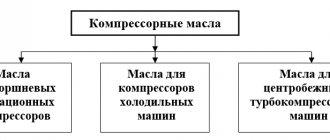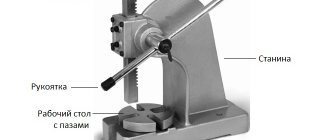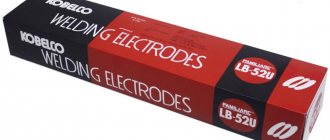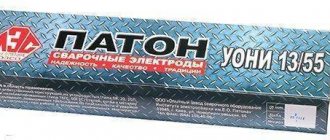In order for the air compressor to work properly, it is necessary to select the appropriate oil for the air piston compressor. The composition of such a liquid must perform several functions at once. When choosing this product, it is necessary to take into account that almost each type has individual characteristics. For each specific case, the appropriate liquid is selected.
Functions of compressor oil
The lubricant material solves a number of problems aimed at ensuring stable operation of the compressor:
- lubricates rubbing parts, thereby extending their service life;
- cools the piston group, which heats up during operation;
- seals gaps;
- reduces detonation;
- ensures the tightness of the working chamber.
Insufficient oil level or absence of oil leads to a decrease in the tightness of the compression chamber and a deterioration in compressor performance.
Which oil is best to pour into a piston air compressor - basic properties
The design features of the piston unit dictate special requirements for lubricants that can ensure its uninterrupted operation. Ideal for lubrication is a closed oil pipeline system and a sealed housing. In a reciprocating compressor, the top parts of the piston and cylinder are in contact with the environment, and the oil supplied to the piston group contaminates the compressed air. There is no mechanical separation of the lubrication zone from the compressed air generation zone. This design feature requires finding a solution to two dissimilar problems:
- on the one hand, it is necessary to reduce the amount of lubricant to an acceptable minimum in order to ensure the purity of the compressed air;
- on the other hand, it is necessary to provide high-quality lubrication of the rubbing elements.
To solve these problems, the oil that needs to be poured into the air compressor must have special properties:
- good adhesion, due to which the lubricant is kept in a limited area and does not enter the air stream;
- stability of properties with increasing temperature - this is important, since the unit is prone to heating;
- high flash point, ensuring fire safety of the unit;
- ability to displace water particles;
- a strictly standardized viscosity value - a composition that is too liquid will flow out of the lubrication zone, and a composition that is too thick will be ineffective;
- minimal tendency to carbon deposits.
There is another important requirement that applies to all lubricants - the absence of substances harmful to the environment and human health.
Owners of air piston compressors often ask the question: is it possible to use automotive oils for internal combustion engines?
Answer: it is not recommended to use them in the piston group, since they do not have the necessary qualities. Compressor oil meets improved environmental characteristics compared to automobile oil, provides higher fire safety, and has other optimal viscosity parameters.
Air compressor. Filling with Oil. First Start.
Myth No. 4: How much compressed air a compressor consumes is equal to its performance.
This statement is completely false. Performance does not depend on the volume of air consumed, but on temperature conditions and ambient pressure, that is, on suction conditions.
The characteristic of a piston compressor is its suction performance (theoretical), which actually corresponds to the volume of air that the device can consume in a certain unit of time. However, in reality this value will be significantly less - real performance is approximately 1/5 lower than theoretical.
Read also: Internal metric thread GOST
Main characteristics taken into account when choosing compressor oils
The main properties of lubricants for compressors running on an electric motor or internal combustion engine:
- Viscosity. Characterized by values 1-15. The optimal value is 10-12. This composition is well retained in the lubrication zone. A product with a lower viscosity is consumed very quickly. Viscosity also characterizes the tendency of a lubricant to lose performance at high temperatures. The higher the viscosity value, the more resistant the product is to heat.
- Availability of additives. High-quality lubricants from well-known manufacturers always contain additives that increase valuable performance properties - anti-oxidation, anti-foaming, anti-corrosion, temperature stability. In domestic labeling, the presence of additives is indicated by the letter “P”, in foreign labeling – I.
- Self-ignition temperature. For air compressors, lubricants with this parameter not lower than +350 °C are recommended.
- Pour point. This is an important quality taken into account when it is necessary to operate compressor equipment in winter conditions.
Rules of service
Depending on the performance of the model, different amounts of new oil will be required. It is recommended to add some lubricant to the figures indicated by the manufacturer for shrinkage in the system.
first de-energize the installation, disconnect it from the tools and allow it to cool;
a container is placed under the crankcase where the liquid is drained;
washing is carried out (15 minutes), when high-viscosity oil is poured in, the unit is turned on, then drained;
cleaning the check valve and air filter;
New oil is poured just above the marked level.
After purchasing the unit, the first replacement is carried out after 50-100 hours (break-in period), then a scheduled check is carried out every 300 hours of operating mode.
Approximate amount of lubricant required:
for a household device—300-350 g;
for professional - 0.7-2 l.
If the equipment operates at constantly high temperatures, then the formation of resins occurs much faster, and maintenance will be required more often than in a standard situation.
Compressor oil lubricates the mechanism parts and at the same time helps to seal the discharge chamber. You should not skimp on the quality of oil for air compressors. It is refilled quite rarely; a small canister lasts a long time, but the equipment will operate smoothly and not experience unnecessary stress.
Tags: change the oil on the fubag compressor
,
fubag compressor oil change
Source
How to choose the right oil to fill an air piston compressor
The best option is to purchase the oil specified in the technical data sheet for the compressor and fill it in a volume that is slightly higher than that recommended by the manufacturer.
If the technical certificate for the equipment is missing for some reason, you can resort to the following methods:
- find the official website of the manufacturer or company producing compressors with similar technical characteristics;
- get advice from a store that is an official dealer of the brand, or from a service center that services such units;
- When purchasing used equipment, ask the seller about the features of servicing compressor equipment.
A particularly important characteristic that must be taken into account when choosing a lubricant is temperature limitation.
Instructions for use
In order for compressor oil to provide effective protection of the mechanism, you must follow the main rules for its use:
- To select the correct class and type of oil, you must carefully read the technical instructions before filling. Manufacturers of compressor equipment always indicate the recommended lubricant in the specification;
- When filling, half of the required volume of lubricant is poured directly into the compressor mechanism, and the second half into the oil tank (receiver). In this case, the oil will be evenly distributed throughout the entire volume of the mechanism, ensuring the most complete filling of the gaps between the rubbing parts;
- When starting a compressor with freshly filled oil, there is a high probability of water hammer occurring, which can damage internal components and parts of the equipment. To avoid this problem, it is necessary to rotate the shaft manually several times to evenly distribute the lubricant;
- After filling, do not immediately turn on the compressor. It is necessary to wait about an hour, allowing the compressor oil to settle and fill all internal gaps;
- The oil must be changed in accordance with the manufacturer's technical recommendations, after a certain number of operating hours. If the operating hours during operation of the compressor are not calculated, then the optimal option would be the oil change range - twice a year.
Correct use of oils will increase the service life of compressor equipment, reducing wear of its units and components.
It is prohibited to mix different types of oil when filling, and when changing oil, the oil system of the mechanism must be flushed.
Examples of oil labeling
- K-19, KS-19 are low-sulfur oils that can be used in medium and high pressure compressors.
- K3-10 – compositions that maintain performance characteristics up to +200 °C.
- K2-24, K3-20, K4-20, K2-220 - such oils can be poured both into compressor engines and into the piston area.
- VB, VB-I, DAG – are designed for use in any type of compressor equipment in which the temperature does not exceed +140 °C. The presence of the letter I in the designation indicates the presence of special additives that increase the performance properties of the lubricant composition.
- VC, VC-I, DAA. They are in demand in permanently installed units with a temperature limit of +160 °C, and in mobile units operated in open space, +220 °C.
- VD, VD-I, DAB. Such oils are poured into powerful air piston compressors with a temperature limit of +220 °C, regardless of the location of operation of the equipment.
What kind of oil goes into an air piston compressor - recommended brands
For uninterrupted operation of air compressor equipment, it is recommended to use only special certified compounds. Possible options:
- Ariane K-12. Inexpensive mineral oil, which is poured into compressors providing medium and high pressure levels. Features a reduced amount of sulfur. Another low-sulfur product is Ariane K-28. Its advantage is the complete absence of mechanical inclusions.
- BP Enersyn GCS-180. A synthetic composition that cannot be combined with a mineral one. Designed specifically for piston compressor units. Contains antioxidants.
- Fubag. Oils of this German brand can be used in air compressors of other brands, including Chinese ones. They contain a complex of additives that prevent oxidation processes at any temperature and the formation of coke deposits.
- KM100 Enkor 40612. Economical due to the minimum level of evaporation. This oil can be poured into the compressor in winter, since it is adapted to work at low temperatures.
- Mobile Rarus. Product suitable for all types of air compressors. It is characterized by: reduced viscosity, high combustion temperature, low ability to form carbon deposits.
- Mineral oil "Zubr ZMK-PS" is an acceptable option for household compressors. This wear-resistant product does not require frequent replacement.
Which oil is better to pour into the compressor - mineral or synthetic?
Mineral products are cheaper. They are usually used in compressor equipment used periodically, since they have a short operating period. Mineral lubricants are characterized by a strict temperature limit, usually +90 °C. At higher operating temperatures, the oil may ignite or cause detonation.
Synthetic compressor oils have a higher price, justified by a set of valuable characteristics:
- possibility of use at elevated operating temperatures: +180…+200 °C;
- maintaining performance characteristics at subzero temperatures, which allows the use of synthetic lubricants in winter;
- long service life, which is 3-4 times higher than that of mineral products.
Synthetic compressor oils are usually purchased for powerful, frequently used units.
Composition and capacity
For operation under normal conditions, base mineral or synthetic oil is used, and in conditions with increased requirements for the characteristics of the lubricant, compressor oils with additives are used. They are made from highly refined sulfur or low-sulfur oil with the addition of oxidation and corrosion inhibitors and anti-wear additives.
Compressor oils are supplied in plastic cans and buckets of 5, 10, 15 kg, as well as in large capacity barrels (150-200 kg).











